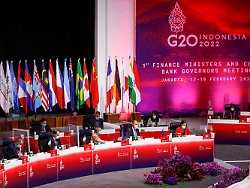So far, the Kremlin has reacted calmly
G20 and the difficult handling of Russia
04/18/2022, 08:01
The G20 meeting in Washington is overshadowed by the Russian war of aggression in Ukraine. Canada speaks of an “unproductive meeting”, the USA would like to throw Russia out, but Germany urges restraint. And Russia? Responds in public in a relaxed manner.
For the first time since the Russian attack on Ukraine, ministers from the “Group of 20”, the world’s most important industrialized and emerging countries, are meeting in Washington this week. Russia is also a member – which raises the difficult question of how to deal with the warring country at international summits. Can the G20 tolerate the Russian finance minister sitting next to his colleagues at the table or at least participating virtually as if nothing had happened?
The economic consequences of the war in Ukraine – skyrocketing inflation rates, severe sanctions and the energy crisis – will keep the finance ministers in the US capital busy. They meet on the fringes of the spring meeting of the International Monetary Fund and the World Bank, where the immense impact on food supplies in developing countries is likely to be a topic. Normally the G20 speak with one voice after such meetings – but is that possible if the country that caused all the suffering also has a say?
In February, even before the war began, the G20 finance ministers had been struggling to come up with clear words about the looming conflict. In the final paper of their meeting, they only stated that they wanted to continue monitoring risks from geopolitical tensions. There was a clear discussion in the round, said Finance Minister Christian Lindner – but that did not appear in the communiqué. Not so with the finance ministers of the G7, of which Russia is not a member: they announced a forceful response and swift sanctions should Russia attack Ukraine. The longer the war lasts and the more atrocities become known, the deeper the rift between the West and Russia now widens. US Treasury Secretary Janet Yellen has already made it clear that the US intends to boycott certain G20 meetings when Russian representatives attend. Canada also emphasizes that Russia cannot currently be a constructive partner in the G20. Germany is keeping a low profile, but there are signs that it does not want its own behavior to be indirectly dictated by Russia.
Indonesia invites all members
The invitations to the meetings are in the hands of Indonesia, which currently chairs the G20. A representative of the local finance ministry told the German Press Agency that Indonesia had invited all G20 members to the finance ministers’ meeting – and that each of them had the right to attend. According to the registration list, 42 delegations wanted to travel to Washington, while others wanted to take part virtually. According to dpa information, it can currently be assumed that the Russian Finance Minister Anton Siluanov will connect digitally. That would at least take away some of the explosiveness of the meeting in Washington. Just like the possibility of forgoing a joint final paper, so that in the end you don’t have to formulate a common line with Russia. A further escalation level could be to allow Siluanov to take part, but not to give him the right to speak.
The Russia question will probably be more difficult to solve at the meeting of heads of state and government in mid-November on the tourist island of Bali. President Vladimir Putin appears to want to attend in person, regardless of the war. Canadian President Justin Trudeau told local media that it would be “extremely difficult for us and unproductive for the G20” to sit at a table with Putin. You can’t just pretend everything is fine. US President Joe Biden would like to exclude Putin, whom he described as a war criminal, from the “Group of 20”. If that doesn’t happen, Ukraine should at least be invited to the circle, he said in March. Australia is also strictly against Putin’s participation in the summit.
Exclusion of Russia unrealistic
An exclusion, however, is considered very unrealistic. In German government circles, it is pointed out that the G20 also includes countries that are neutral in the conflict. China, India and South Africa abstained from a United Nations vote on a resolution condemning the war in Ukraine. China has also spoken out against excluding Russia. The summit in Bali will primarily deal with economic issues, and the meeting should “not be politicized,” said Foreign Minister Wang Yi, according to the Beijing Foreign Ministry.
And Russia itself? So far, the Kremlin has reacted demonstratively calmly. Most G20 members are currently waging an economic war against Russia anyway, so an exclusion is “not fatal,” said Kremlin spokesman Dmitri Peskov, according to the Tass agency. Russia was kicked out of the international group of the largest economies in 2014 after capturing the Ukrainian Black Sea peninsula of Crimea. Since then, the G8 are just the G7. This makes things a lot easier for the German government. This is because Germany is organizing the G7 summit of heads of state and government at Schloss Elmau in Bavaria this summer. The question of whether to unload Russia no longer arises here.
